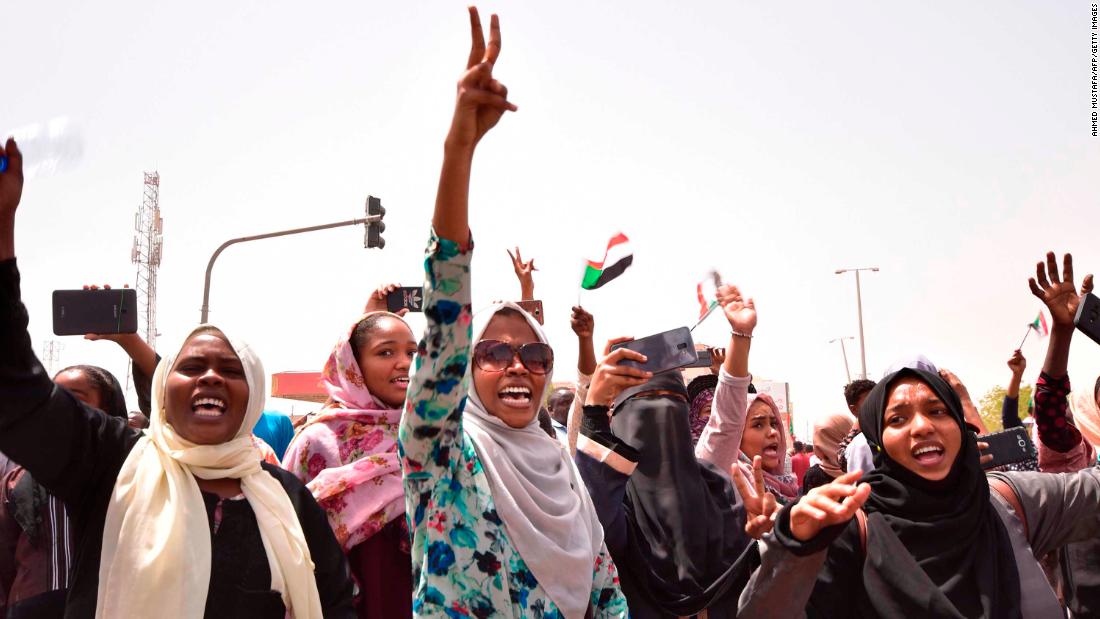
As news of Bashir's downfall was still reverberating around the world, a military council dissolved the government, suspended the country's constitution and declared a three month state of emergency. The military said it will remain in control for at least two years to oversee a "transition of power," leading to dismay from protesters and outside observers that elections will not be held anytime soon.
In a statement, the African Union said that a military takeover "is not the appropriate response to the challenges facing Sudan and the aspirations of its people."
It added that Sudan was a signatory to international treaties which "strongly condemn any unconstitutional change of Government and commit member states to the respect of the rule of law, democratic principles and human rights."
On Thursday, protesters celebrating their victory over Bashir quickly turned to chanting against the country's defense minister, Awad Mohamed Ahmed Ibn Auf, who made a statement explaining the military's seizure of power on state TV.
"The people want to topple Ibn Auf," a crowd chanted in Khartoum.
The group that has been leading the anti-government protests, the Sudanese Professionals Association, or SPA, rejected the "coup declaration," and has called on people to press on with demonstrations and to stage a sit-in outside military headquarters.
The group said protests would continue until "power is handed over to a civilian transitional government."
"The regime has conducted a military coup to reproduce the same faces and entities that our great people have revolted against," the SPA, an umbrella organization of doctors, lawyers and journalists, said in a statement, Thursday. "Those who destroyed the country and killed its people want to appropriate every drop of blood shed by the great people of Sudan during their revolution."
Speaking to CNN, activist Omar al-Neel said that "the street refuses totally the announcement by Ibn Auf."
"All Sudanese people are in the street and demanding the downfall of the regime and not recycling the same people," he said.
Key 'test' for military
The US said Thursday that it had ordered the departure of all non-emergency US government personnel from Sudan following the coup against President Bashir. The State Department also raised its travel advisory to the highest level -- Level 4: Do Not Travel.
The UK also warns against "all but essential travel to Khartoum and all remaining areas of Sudan."
State Department spokesman Robert Palladino said the US is "monitoring" the situation and that the "big focus for the United States right now is the safety and welfare of our embassy team on the ground as well as private citizens, American citizens in Sudan."
He added that "the Sudanese people should determine who leads them and their future," and that they "should be allowed to do so sooner than two years from now."
Human Rights Watch associate Africa director Jehanne Henry said how the new Sudanese authorities handled protests against them would be a key "test" for the new regime.
"Protestors watching are right to be skeptical," she said, adding that Ibn Auf "doesn't have a good record at all ... the US has sanctioned him for his role in Darfur atrocities."
On Friday morning, the UN Security Council is set to discuss developments in Sudan in closed door discussions, according to the United Kingdom Mission to the United Nations.
Jonathan Allen, UK deputy permanent representative to the United Nations, said Thursday that "the main message again is there must be no violence against those protesters."
"The change proposed by the military isn't enough. It's not enough to say that it's a two-year transition to civilian rule is adequate," Allen said. "We need to see much faster transition. We need to see civilian rule now. That's what the protesters have been calling for, and that is what we need to do."
Fall of a dictator
Bashir took control after a coup in 1989 and became President in 1993. He stands accused of conducting a campaign of ethnic cleansing in the country's Darfur region, and was nearly arrested in 2015 while visiting South Africa. He faces five counts of crimes against humanity and two counts of war crimes in connection to Sudanese military actions in Darfur.
The International Criminal Court has issued two arrest warrants for him and considers him to be "at large."
At 3:30 a.m. Thursday, Bashir was visited by the heads of his four main security apparatuses and was told "there was no alternative" but for him to step down, two senior military sources with direct knowledge of the conversation told CNN.
According to the sources, Bashir responded by saying "with the blessings of God," an expression of acquiescence in Islamic tradition.
Bashir is under house arrest, according to sources. His personal guard has been replaced and is under close watch, sources added. Sudanese Prime Minister Mohamed Taher Ayala and Ahmed Haroun, the head of the ruling National Congress Party, were among dozens of officials who were also arrested, a top military official with direct knowledge of the arrests told CNN.
CNN's stringer in Khartoum witnessed military troops storming the Islamic Movement headquarters, the main component of the ruling party.
The Sudanese Intelligence Agency said it ordered the release of all political detainees, the official Sudan News Agency, or SUNA, reported Thursday. More than 3,000 people have been arrested since protests began in December, based on testimony CNN gathered from activists, lawyers and victims.
Bagikan Berita Ini














0 Response to "Joy turns to fear in Sudan as army takes control after ousting Bashir"
Post a Comment